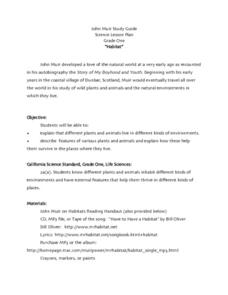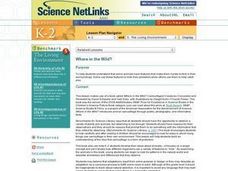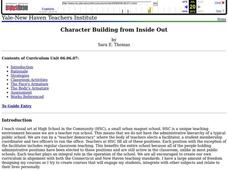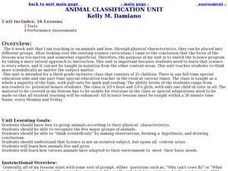Channel Islands Film
Natural Resources, and Human Uses of Plants and Animals
As part of their study of the restoration projects on Santa Cruz Island, class members demonstrate their understanding of the connections among plant life, animals, and the actions of humans by crafting a model that reveals these...
Scholastic
Minibeasts
Lead young scientists to discover insects outdoors. After investigating, students will record observations, learn about these fascinating creatures, craft, and role play.
Curated OER
I spy (Camouflaged Animals in Art!)
Students create a picture of a camouflaged animal in its habitat. In this visual arts lesson, students look at Hans Hoffmann's painting A Hare in the Forest and discuss the animal's camouflage. They research their own animal to create a...
Curated OER
Close to Home
Fourth graders examine habitats for animals by creating their own in class environment. In this environment lesson, 4th graders research the Internet for information on certain wild animals and the places in which they live. Students...
Curated OER
Happy Habitats
Students explore different habitats. In this habitat lesson plan, students investigate four different habitats through participating in a WebQuest. Students create an animal web using Kidspiration or a video documentary upon completing...
Curated OER
The Game of Life
Students explore the game of life which refers to what happens to a species when most of the population is gone. In this endangered species activity, students describe what it means for a marine animal to be endangered. Students then...
Curated OER
Desert Adaptations
In this desert adaptations worksheet, students are given a water filled sponge which represents an animal. Students observe their "animal" for a 24 hour period and conserve the water in the sponge as best they can. They measure and...
Curated OER
Bird Brained?
Students identify general abilities that indicate animal cognitive intelligence. In this biology instructional activity, students create an intelligence testing challenge for ravens. They compare its ability to that of a crow.
Curated OER
Deserts: How Do You Define One?
Second graders identify what constitutes as a desert by reading a habitat checklist. In this environment lesson plan, 2nd graders read a nature website to discover facts about the desert and where they are located. Students utilize art...
Curated OER
Rainfall Mapping
Students explore rainfall and habitats. In this rainfall lesson, students explore the relationships among rainfall, vegetation, and animal habitats. Resources are provided.
Curated OER
Animals and Humans Say the Darnedest Things
Students explore and analyze human and animal communications and create a short film that illustrates their findings.
Curated OER
Out of This World
Fifth graders animate their own planets. In this solar system lesson, 5th graders use smartphones and the software, GoKnow Sketchy, to create images for presentations on their created planets that appear to be animated when played at a...
Curated OER
Pandas, Flamingos and Blogs
Students use the computer to discover animals. In this animal lesson, students look at online webcams to view animals and write in a daily blog discussing what the animals are doing. They use either Pixie or PowerPoint to create an...
Curated OER
"Habitat'
First graders explore and explain that different plants and animals live in different kinds of environments. They illustrate various plants and animals and how they survive in the places where they live. A nature journal for enrichment...
Curated OER
Student Designed Investigations: Observations
Students choose an organism and create an experiment with that organism. In this observation instructional activity, students expose a living thing to something from its environment and record their observations. Students must have some...
Curated OER
Farming Number 6
In this environment worksheet, students identify and explain the importance of water and farming. They identify the differences between food items and whether they are a fruit, vegetable, or animal. Students also respond to 5 yes/no...
Curated OER
Design a Plankton
Students explore animal and plant adaptation. In this ecosystems science lesson, students view websites to gain information about plankton and its interdependence within ecosystems. Students identify ways in which plankton has adapted...
Alabama Learning Exchange
Animals as Pets: Everything You Need to Know
Students complete internet based research on pet care in order to prepare a written and oral presentation for the class. They examine the life span, environment, food and grooming of the pet they chose to research. They complete the...
Curated OER
Just "Kid"ding Around: The Truth About Goats
Students examine goats, and read a book based on their history. In this animal lesson, students discover the history of the goat, and complete several activities based on the students' knowledge of the animal.
Curated OER
Where in the Wild?
Young scholars investigate the purpose of animals' ability to camouflage. In this animal science lesson, students read the text Where in the Wild? and identify animals that are predators and prey. Young scholars discuss how camouflage is...
Curated OER
Character Building from Inside Out
Students relate the facial muscle location with a person's expressions. In this visual arts lesson, students write a fictional story about a character. They use digital cameras and computer softwares to create an animation film about it.
Curated OER
Animal and People Habitats
Students examine how animals create a unique space in which they can live. Students read a poem about animals' habitats discuss the habitats. They draw a space of their own and write a poem that describes their habitat.
Curated OER
Animal Life Cycles
Learners participate in numerous activities to gather information about parts of the life cycle. In this life science lesson, the teacher choose from a number of activities to create or support an interdisciplinary unit about the life...
Curated OER
Animal Classification Unit
Third graders study how to group animals by their physical characteristics. They examine how animals have adapted to have their needs met by the environment.

























